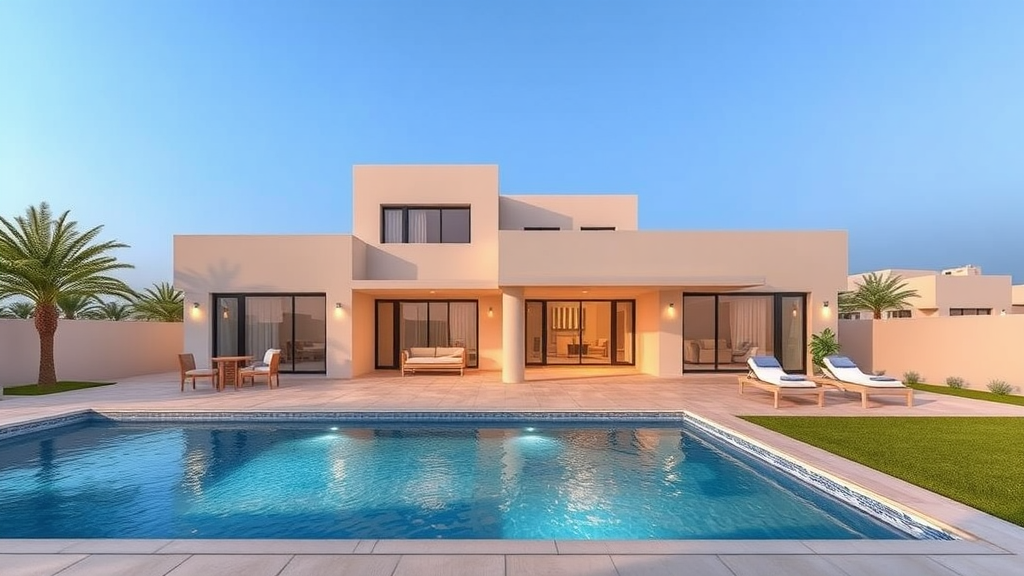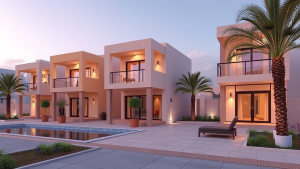Comparing the cost of living in Hurghada for €600 a month vs. €2,000 in major european cities
When considering a lifestyle shift, many people weigh their options carefully. Two vastly different living scenarios can be found when comparing the cost of living in Hurghada, Egypt, where one can live comfortably on €600 a month, to major European cities requiring a budget of €2,000 or more. This comparison isn’t just about numbers; it delves into the quality of life, expenses, and cultural experiences.
Housing costs
Housing is typically one of the largest expenses. In Hurghada, you can find a one-bedroom apartment close to the beach for around €250 to €350 per month. This price often includes amenities like water and electricity. In sharp contrast, major European cities such as Paris or London demand significantly more. Renting a similar apartment can cost between €1,200 and €1,800, depending on the area.
Food and dining
Food represents another key area of expenditure. In Hurghada, a monthly grocery budget can be maintained within €100 to €150. Local markets are abundant, providing fresh fruits, vegetables, and meats at reasonable prices. Dining out is also inexpensive, with meals at casual restaurants typically ranging from €5 to €10.
In Europe, food costs ramp up considerably. Monthly grocery expenses can range from €200 to €400. Eating out is also a major factor, with a basic meal costing anywhere between €15 and €30. The presence of various cuisines means you can sometimes find cheaper options, but dining in Europe generally demands a larger budget.
Utilities and internet
Utilities in Hurghada, including electricity, heating, cooling, and water, usually add up to about €50 to €100 per month based on personal usage. Internet service is also affordable, costing around €20 per month.
In Europe, you can expect utilities to be higher, with monthly costs ranging from €150 to €250. Internet services also escalate, often starting at €30 per month. When you add these costs together, the expenses quickly accumulate, pushing your budget even higher.
Transportation expenses
Getting around in Hurghada is quite economical. Public transport or taxis can cost you as little as €1 per ride. For those choosing to own a vehicle, fuel prices are significantly lower compared to Europe. This keeps your transportation costs manageable, allowing flexibility without breaking the bank.
In contrast, in major European cities, transportation can become a substantial part of your monthly budget. Public transport passes often cost around €80 to €150 per month. Additionally, owning a car can be a financial strain due to high fuel costs, insurance, and parking fees, further inflating your monthly outlay.
Leisure and entertainment
Leisure activities in Hurghada, whether it’s lounging on the beach or enjoying local nightlife, are generally low-cost. A movie ticket can be around €3, and plenty of outdoor activities are either free or very cheap. This allows residents to enjoy life without feeling financially pressured.
Conversely, entertainment in European cities can carry a hefty price tag. Tickets for movies, theatre, or concerts can exceed €15, and dining in more social settings can quickly escalate your costs. The diverse options in major European cities do provide exhilarating experiences but often come at a price.
Healthcare and insurance
Another critical aspect is healthcare. In Hurghada, basic medical services are affordable. Many residents opt for private health insurance that can cost around €25 to €50 a month, covering most of their healthcare needs.
However, in Europe, healthcare can be considerably more expensive if not covered. Even with insurance, residents might find that basic plans can range from €100 to €200 per month, depending on the country.
Quality of life comparison
Living in Hurghada for €600 allows for a slower pace of life, with stunning beaches, sunshine, and a welcoming culture. This makes for a fulfilling lifestyle filled with outdoor activities and community engagement.
On the other hand, €2,000 in a major European city can afford a fast-paced life with countless cultural offerings, events, and entertainment. Yet, this can also come with high stress and a constant push to maintain or improve one’s financial standing.
Ultimately, the choice depends on your priorities—whether you value a vibrant community with a relaxed lifestyle in Hurghada or the hustle and bustle of a major European city with its myriad opportunities and experiences. Balancing your budget against your lifestyle preferences will guide you in making the best decision for your next adventure.
The lifestyle and cultural differences between Hurghada and major european cities
Living in Hurghada can be a fascinating experience, especially when compared to lifestyle options in major European cities. For those considering a budget-friendly way of life, Hurghada stands out. The vibrant coastal town on the Red Sea offers a unique mix of culture, lifestyle, and affordability that is difficult to match in Western Europe, where living costs can be significantly higher.
When you think about lifestyle in Hurghada, the first thing that comes to mind is its stunning beaches. Imagine waking up every morning to the sound of waves and breathtaking sunrises. You might spend your days lounging on sandy shores, swimming in crystal-clear waters, or engaging in water sports like snorkeling and diving. In contrast, major European cities often boast parks and recreational areas, but the availability of a personal beach experience is rare and often more expensive.
The cost of living in Hurghada is remarkably lower than in top cities like Paris, London, or Amsterdam. While you might manage a budget of around €600 a month in Hurghada, this could barely cover rent in a major European city, where €2,000 could be just the beginning. Here’s a brief comparison of costs you might face:
- Accommodation: In Hurghada, you can find a comfortable one-bedroom apartment for around €200-€300 per month. However, in major European cities, expect to pay upwards of €1,000 for a similar apartment.
- Utilities: Monthly utilities in Hurghada typically cost between €50-€100, whereas in many European cities, it can soar to €150 or more.
- Food: Dining out in Hurghada is very affordable. You can enjoy a meal at a local restaurant for as little as €5-€10. In contrast, a meal in a European city could easily cost €20-€30.
- Transportation: Public transport in Hurghada is cheaper, with bus fares as low as €0.50. In cities like London or Berlin, a single ticket can cost up to €3.
Beyond costs, the cultural differences are striking. Living in Hurghada immerses you in a rich tapestry of Egyptian culture. The hospitality of the locals is warm and inviting, offering a sense of community that can be harder to find in larger, bustling cities. Markets, called souks, are vibrant and filled with local produce, handcrafted items, and spices, making grocery shopping an adventurous experience. Major European cities, while often diverse and multicultural, may feel more segmented, with distinct neighborhoods that might not foster as much local interaction.
The pace of life in Hurghada is generally more relaxed. Locals take their time, enjoying meals and socializing, which stands in contrast to the fast-paced lifestyle you might find in a metropolis where efficiency often reigns supreme. People in European cities are often rushing to meet demands, making casual conversations with strangers less common.
Social activities in Hurghada largely revolve around outdoor and water-based experiences. You have access to incredible diving spots and excursions to beautiful locations like the Giftun Islands. European cities, on the other hand, offer various cultural events, like theater performances, concerts, or museum exhibitions. These experiences can be thrilling and enriching, but they come with a price tag that often exceeds what you would spend for a day of fun in Hurghada.
Education and healthcare are other aspects to consider when comparing lifestyle. In Hurghada, local schools focus on providing a blend of local and international curricula, though options may be limited compared to those in larger European cities, which often boast extensive educational resources and international schools. Healthcare in Hurghada is generally accessible and affordable; however, it might not provide the same level of specialty services as you would find in bigger cities.
If you’re considering a transition from a European city to Hurghada, it’s essential to weigh not only the financial aspects but also how each location aligns with your lifestyle preferences. Whether you crave adventure, cultural immersion, or just a quieter pace of life, Hurghada offers a unique alternative that can be both enriching and budget-friendly compared to major urban centers in Europe.
Living in Hurghada for €600 a month presents a unique opportunity that starkly contrasts with the experiences found in major European cities where living costs often reach €2,000 or more. With affordable housing, lower day-to-day expenses, and rich cultural experiences, Hurghada attracts those seeking both adventure and financial freedom. The mesmerizing beaches of the Red Sea, coupled with friendly local communities, offer a more relaxed lifestyle, allowing you to enjoy life’s simple pleasures without the financial strain typical of larger European urban centers.
On the other hand, while cities like Paris, London, or Berlin boast vibrant cultures, historic architecture, and a wealth of activities, these come at a significant price. High living costs can lead to a more stressful lifestyle, where work and financial responsibilities often overshadow leisure and personal time. The hustle and bustle might be thrilling, but it also requires careful budgeting and sacrifices in personal enjoyment.
Ultimately, the choice between living in Hurghada or a major European city hinges on what you value most. If affordability, a slower pace of life, and a warm climate resonate with you, Hurghada makes an appealing case. However, if cultural vibrancy and access to modern amenities are your priorities, a European city might suit you better. Weighing lifestyle preferences against the costs will guide you towards the living situation that best meets your needs and desires, ensuring you make the most of your financial investments.











